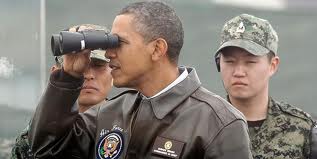US President Barack Obama landed in Seoul Friday, a day after failed to reach a trade agreement with Japan.
US President Barack Obama landed in Seoul Friday, a day after failed to reach a trade agreement with Japan.
The American president landed at a US Air Force base outside a South Korean capital, as reports were claiming that North Korea was readying another nuclear test.
The US-Korea Institute at Johns Hopkins University cited satellite photos taken just two days ago as showing additional activity at North Korea's Punggye-ri test site that is "probably related to preparations for a detonation".
Obama’s four-nation Asian tour began in Tokyo, where he urged China to rein in its wayward ally, saying Beijing had a "critically important" role to play in defusing tensions on the volatile peninsula.
"North Korea has engaged in provocative actions for the last several decades," he said. "It's been an irresponsible actor on the international stage for the last several decades.
"They are the most isolated country in the world. They are subject to more international sanctions and international condemnation than any country in the world."
In an interview ahead of his arrival in Seoul, he warned North Korea could expect a "firm response" if it made "the mistake" of conducting another nuclear test.
Earlier on Thursday, Obama left Tokyo empty-handed having arrived Wednesday hoping for demonstrable progress on levering open Japan's tightly guarded auto and agricultural sectors -- key sticking points in setting up the 12-nation Trans-Pacific Partnership (TPP).
That did not appear to happen, as Obama and Japanese Prime Minister Shinzo Abe emerged from talks on Thursday saying only that they had instructed their negotiating teams to keep trying, even as the US leader demanded "bold steps" from Japan.
But a senior US official told reporters aboard Air Force One that the intense discussions with the Japanese had gathered new momentum after Obama and Abe dined at an exclusive sushi restaurant on Wednesday.
The official said there were still details to be worked out and negotiations would go on, but that the week's talks -- dubbed "sushi diplomacy" by the Japanese press -- should be viewed as a "key milestone".
"(Both sides) felt... that on the basis of what we accomplished this week, we have a breakthrough."